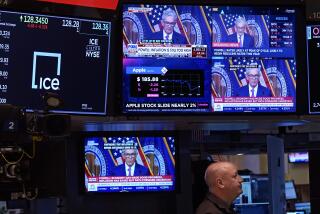Wall Street bonuses soar 17% in 2009, even as banks reduce pay for top executives
- Share via
Reporting from New York — Bonuses at Wall Street firms jumped 17% last year, showing how quickly the industry had rebounded from the financial crisis, New York state’s top economic office reported Tuesday.
Although investment banks have responded to public anger over compensation by reducing the pay of some high-profile executives, the new figures suggest that, for other employees, bonuses are rising. At three leading firms -- Goldman Sachs Group Inc., Morgan Stanley and JPMorgan Chase & Co. -- compensation in 2009 rose 31% from 2008, averaging $340,000 per employee, the state comptroller’s office said.
For securities-industry employees in New York City, bonuses rose 17% to $20.3 billion last year. But that was still down more than a third from 2006 and 2007.
After losing $42.6 billion in 2008, the industry recorded profits last year of $55 billion, triple the previous record.
Moreover, employment in New York City’s financial services sector bottomed out last summer after the sector lost 31,500 jobs, a decline of 17%, during the crisis. In the last five months of 2009, the industry added 3,900 jobs.
New York State Comptroller Thomas P. DiNapoli said other sectors of the city’s economy weren’t seeing a rebound in jobs.
“My concern is that all boats rise, and at this point only the Wall Street boats are rising,” DiNapoli said at a news conference.
“For most New Yorkers and Americans, these huge bonuses are a bitter pill to swallow and hard to comprehend,” DiNapoli said, attributing the industry’s big profits to the Federal Reserve’s actions to lower interest rates and other government responses to the crisis.
The data come from New York state tax records and provide the first broad statistical look at the recovery of Wall Street banks in 2009.
Despite the overall rise in compensation, the figures suggest bankers have taken steps to limit pay packages. Before the crisis, Wall Street firms generally allocated 50% of their revenue to compensation. In 2009, the figure was down to 40%.
But this year, many banks have given more compensation in the form of deferred stock. This was done largely in deference to public anger -- but it had the effect of artificially lowering the pay figures for 2009. As a result, employees could make much more from 2009 than the $20.3-billion figure that DiNapoli cited Tuesday.
DiNapoli expressed concern that the soaring profits could indicate that the industry had returned to the risky behavior that helped cause the financial crisis.
“We want to be sure that we don’t fall back into bad habits,” he said.
nathaniel.popper @latimes.com
More to Read
Inside the business of entertainment
The Wide Shot brings you news, analysis and insights on everything from streaming wars to production — and what it all means for the future.
You may occasionally receive promotional content from the Los Angeles Times.










